Is your child obsessed with sugar?
No matter how much we keep talking about sugar, it’s a concern for most parents. And I can relate. To be honest, my kids ate Easter candy for breakfast this year. We opened Easter baskets first thing in the morning and my kids were thrilled to tear through them. They tried their different candies and played with new toys. By the time I made breakfast, they came to the table and didn’t take a bite.
As the day progressed they ate less and less. Then we did an Easter egg hunt and my mom dropped off Easter baskets with a few more candies, crackers, and toys.
At this point I reminded my 7 year old about his shaved ice tummy ache last summer. We were camping and my oldest ate many sugar-laden snacks and then topped them off with an all you can syrup shaved ice. He was doubled over walking back to our campsite.

Is My Child Obsessed With Sugar?
It might appear my child’s obsessed with sugar because he ate multiple sweets and didn’t feel well after. However, this was an awesome learning experience. At this moment on Easter, I was able to remind him how he felt previously, without lecturing about eating too much sugar. He laughed and reminded his brother and sister not to eat too much candy. Children need experiences, not lectures.
Kids need to feel like they have access to sweets again and again.
I also gave my child the reminder his candy wasn’t going anywhere. He answered back with, “Yeah, just like Halloween. We can have it later or tomorrow.” This moment was about access not restriction. It was about permission. If candy feels limited the mentality turns to
I need to eat it all now, because it’s going away soon!
Instead, Easter was less stressful and more joyful for everyone. I had experiences to refer back to as a reminder, as opposed to cutting him off, telling him how he’s going to feel, or battling about it.
Is your child obsessed with sugar?
There might be a few reasons your child appears to be obsessed with sugar:
Sweets feel restricted.
Think about how it feels when can’t have or do something –> you focus on it more! It’s human nature. Your child will feel restricted if sweets are talked about negatively, only reserved for special occasions, or always limited.
Sweets are used as a bribe.
When candy, cookies, and other sweets are used as a bribe, it automatically elevates them and makes them feel more special. They might be a bribe for finishing they’re dinner, “You can have a cookie if you finish your broccoli.” Or they might be a bribe for another task, “If you get an A on your test we’ll go get ice cream.”
Sugar is demonized.
If sugar is considered bad, unhealthy, poison. These sentiments might seem helpful, as though they’ll help create moderation or avoidance. However, demonizing them leads to black and white thinking. Kids think in concrete terms. So candy is bad lead to, “I’m bad,” but it doesn’t actually help change behavior. So you’re child’s more likely to want to more candy but feel shame and guilt for eating it, a vicious cycle that leads to eating more and more.
Sweets are called ‘treats’.
Calling candy, cake, and ice cream ‘treats,’ or acting like they are, makes them feel like a novelty. Similar to bribing, it elevates them above other foods. If something is a ‘treat’, why wouldn’t I want to have as much as I can? This type of thinking also leads to eating as much as possible when it is available, because by definition, a treat is something out of the ordinary.
If you’re concerned about your child’s sugar obsession, instead of focusing on limiting sugar, look for the underlying reasons they might be fixated on it.
I know that when we feel like they’re already fixated on sweets, it’s scary to let go and actually offer them more. It feels so counterintuitive and just plain wrong.
Instead of restricting sugar, work to neutralize it.
We want sweets: cookies, candy, cakes, and ice cream, to all feel like they’re on the same plane with the same amount of energy as every other food. While cookies may not have the same nutritional value as carrots, we still want them to have the same amount of emotional energy. For more on this, check out How To Create Food Neutrality For Your Child.
Talk about all foods in a neutral or positive tone.
When your child asks for a piece of candy, instead of saying “No,” try a conditional yes: “Yes, you can choose a piece of candy to have with dinner later.”
Offer sweets regularly and without conditions.
For instance, offer cookies with the meal instead of after. Allow your child to eat them at ANY point (yes, even first) without conditions to finish their meal, or their veggies.
Allow your child to experience sugar.
Like my shaved ice and Easter stories, children need experiences to practice self-regulating sugar. They need to have these moments and process through them without judgment. I could have shamed him or said “I told you so,” but instead we talked about why his tummy hurt and that with a little rest it would feel better. It’s more important to instill trust and create a non-judgmental environment than to try to control the sugar. Restriction will lead to it feeling off-limits and extra-special, ultimately resulting in greater intake.
- For more on sweets and how to handle them, grab my FREE sugar guides.


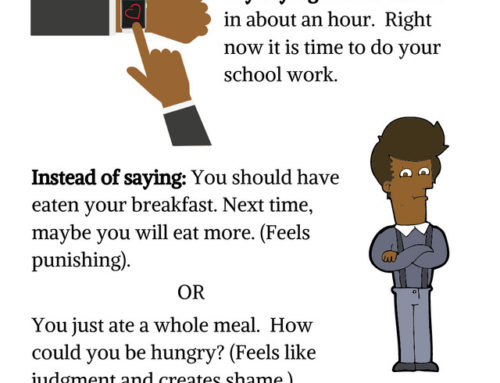
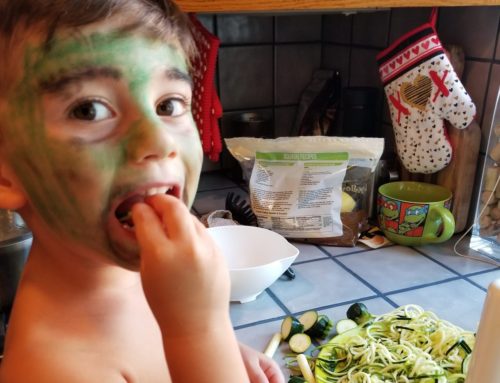
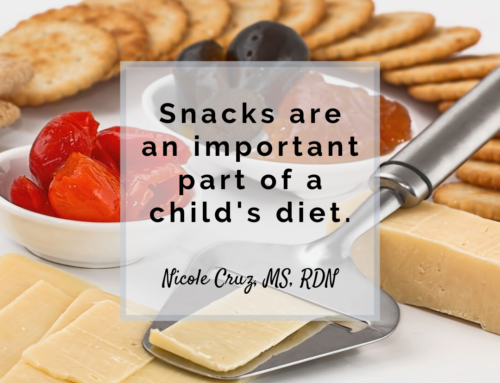
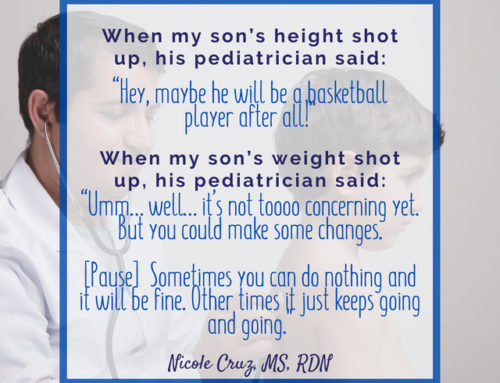
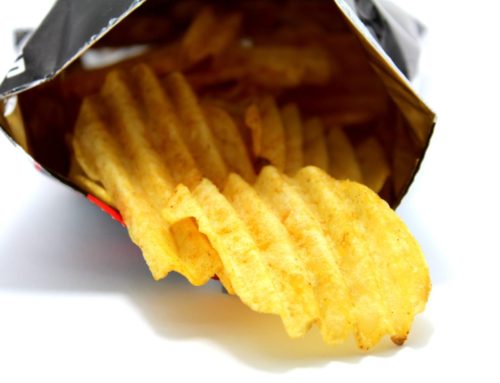

Leave A Comment